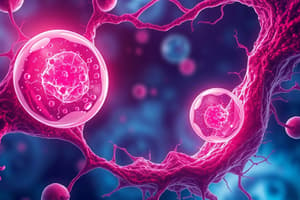Podcast
Questions and Answers
During which phase of meiosis does crossing over occur?
During which phase of meiosis does crossing over occur?
- Prophase II
- Prophase I (correct)
- Metaphase I
- Anaphase II
Which type of transport requires energy to move molecules across the cell membrane against their concentration gradient?
Which type of transport requires energy to move molecules across the cell membrane against their concentration gradient?
- Facilitated diffusion
- Simple diffusion
- Active transport (correct)
- Osmosis
What is the main difference between plant and animal cells that allows plants to produce their own food?
What is the main difference between plant and animal cells that allows plants to produce their own food?
- Cell wall
- Vacuoles
- Chloroplasts (correct)
- Golgi apparatus
Which of the following processes results in two genetically identical daughter cells?
Which of the following processes results in two genetically identical daughter cells?
Which of these organelles is responsible for packaging and modifying proteins before they are transported to their final destinations?
Which of these organelles is responsible for packaging and modifying proteins before they are transported to their final destinations?
If a cell is placed in a hypertonic solution, what is the most likely outcome?
If a cell is placed in a hypertonic solution, what is the most likely outcome?
During which stage of meiosis does the separation of homologous chromosomes occur?
During which stage of meiosis does the separation of homologous chromosomes occur?
Which of these processes is NOT involved in the production of gametes?
Which of these processes is NOT involved in the production of gametes?
What is the primary function of the Golgi apparatus in a plant cell?
What is the primary function of the Golgi apparatus in a plant cell?
Which of the following correctly describes the relationship between the cell cycle and cell division?
Which of the following correctly describes the relationship between the cell cycle and cell division?
Flashcards are hidden until you start studying
Study Notes
Cell Biology Quiz
Transportation Mechanisms
- Active Transport: The movement of molecules from an area of low concentration to an area of high concentration, requiring energy from the cell.
- Passive Transport: The movement of molecules from an area of high concentration to an area of low concentration, without using energy from the cell.
Cell Organelles in Plants and Animals
- Plant Cell Organelles:
- Chloroplasts: Responsible for photosynthesis, present in plant cells.
- Vacuoles: Store water, nutrients, and waste products, larger in plant cells.
- Animal Cell Organelles:
- Lysosomes: Contain digestive enzymes, responsible for breaking down waste and foreign substances.
- Centrioles: Involved in the formation of cilia, flagella, and spindle fibers.
Cell Division
Meiosis
- Purpose: Produces gametes (sperm and egg cells) with a unique combination of chromosomes.
- Process: Involves two successive cell divisions, resulting in four non-identical daughter cells.
Mitosis
- Purpose: Produces two identical daughter cells with the same number of chromosomes as the parent cell.
- Process: Involves one cell division, resulting in two identical daughter cells.
Studying That Suits You
Use AI to generate personalized quizzes and flashcards to suit your learning preferences.




